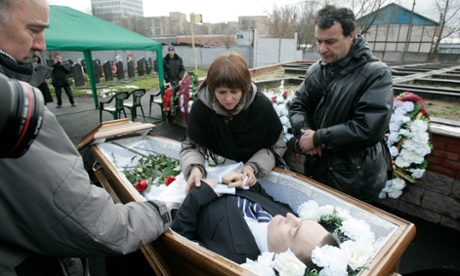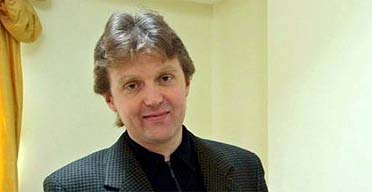A Russian whistleblower took all reasonable precautions in the months leading up to his death, but was nonetheless “fatalistic” about threats to kill him from powerful enemies in Moscow, a friend has said.
Alexander Perepilichnyy collapsed and died in November 2012 outside his luxury home in Weybridge, Surrey, after he had been out jogging. Surrey police insisted there were no suspicious circumstances surrounding his death. But a pre-inquest hearing heard on Monday that traces of a rare and deadly plant poison had been found in his stomach.
The poison – from one of five possible varieties of the lethal gelsemium plant – is the weapon of choice for Chinese and Russian assassins, the hearing was told. A plant expert at the Royal Botanic Gardens in Kew, south-west London, Prof Monique Simmonds, will carry out further blood tests. Her initial findings suggest that Perepilichnyy ingested poison.
Perepilichnyy’s friend – who declined to be named – said on Tuesday: “He was a very nice chap. He was bright. He seemed rational. He tried to be cautious but was definitely quite fatalistic about the threats against him.” The friend met Perepilichnyy on five occasions after he fled in 2010 from Moscow to the UK with his wife and their two children. The Perepilichnyys kept a low-profile, rarely mingling with the large community of Russians in London. They lived in the high-security St George’s Hill estate in Weybridge.
Perepilichnyy was instrumental in exposing a massive alleged money-laundering ring involving the Russian mafia and the Russian state. He provided details of an alleged $230m (£148m) fraud carried out by senior Russian tax officials. The money was allegedly stolen from taxes paid by Hermitage Capital, a hedge fund run by the US-born financier Bill Browder.
The friend met Perepilichnyy in a series of London bars and restaurants in connection with the investigation into the Hermitage fraud allegations. His evidence led Swiss prosecutors to freeze a bank account containing $11m and belonging to the family of a prominent Russian government official. Perepilichnyy decided to come forward after the arrest, torture and death in custody of Sergei Magnitsky, Hermitage’s lawyer in Moscow.
“Typically he drank water or tea. The photos of him are pretty accurate, though when I saw him he was a bit skinnier,” the friend said. He added that in 2011-12 Peripilichnyy had mentioned that the situation in Russia had become dangerous for him and that he was receiving threats. Their last meeting took place shortly before the whistleblower’s sudden death on 5 November 2012. He was 44 and had previously been healthy.
Peripilichnyy’s widow, Nataliya, is still believed to be in the UK. She has not spoken publicly about her husband’s death and a barrister represented her at Monday’s hearing at Woking coroner’s court. Shortly before his death Perepilichnyy is understood to have taken out a substantial life insurance policy. The insurer is believed to have commissioned the independent toxicology reports from Kew.
Simmonds found traces of an ion linked to the gelsemium plant, the most toxic of which is Gelsemium elegans. Similar traces were not found in blood samples. The expert will now retest blood and urine samples – applying different techniques – as well as as a sample taken from the spleen. Perepilichnyy’s last meal may be the key to the case. In 2011 a Chinese billionaire, Long Liyuan, died after eating a dish of cat-meat stew believed to have been laced with the poison. That particular variety of the plant grows only in Asia.
Browder, a notable critic of Vladimir Putin, has also been bitterly critical of Surrey police’s investigation. Browder said he informed the police repeatedly about the threats made against Perepilichnyy in the run-up to his death. Despite this, detectives failed to carry out toxicology tests until three weeks afterwards. In 2013 Surrey police ruled out third-party involvement and referred the death to the Surrey coroner.
Detectives will now cooperate with the coroner while “additional work” and “clarification” takes place, ahead of an inquest on 21 September, Surrey police said on Monday. They declined to say whether they are treating Perepilichnyy’s death as murder. The coroner, Richard Travers, has designated three interested parties: the police, the victim’s family and the unnamed insurer.
Last week Browder sent a lengthy letter to Travers setting out his suspicions that the whistleblower had been murdered. Perepilichnyy was involved in the murky world of semi-legal Russian cash and money-laundering, and many of his associates always felt the death could be suspicious, even if initial tests appeared to yield little evidence.
The backstory behind the death of Magnitsky in prison is one of the darkest episodes in recent Russian history, with authorities refusing to investigate any of the fraud allegations despite substantial evidence.
Magnitsky uncovered major fraud in 2008 after being retained by Hermitage Capital to investigate what had happened to companies that were illegally seized from the fund. Hermitage had been built up by Browder, a naturalised Briton, into the largest investment vehicle in Russia before it fell victim to the fraud.
The lawyer accused a number of Russian officials as being behind the scheme, including Olga Stepanova, a senior tax official, and her husband Vladlen Stepanov. Stepanova authorised a huge tax rebate to a company shortly after it had been seized from Hermitage, and in the aftermath both she and her husband appeared to purchase property in Dubai.
Magnitsky was jailed by the same officials he was investigating, and died in prison after receiving no treatment for a medical condition. Instead of prosecuting those responsible, Russian officials put the dead lawyer himself on trial, in a surreal case in which the defendant’s cage remained empty.
Browder, who was in London after being declared by the Russian government a “threat to national security” and barred entry, was also put on trial. The businessman, who had previously been a predatory capitalist and a cheerleader of Vladimir Putin, became one of the regime’s harshest critics, determined to avenge Magnitsky’s death and lobbying for sanctions against Russia.
Hermitage has suggested that the officials worked with crime world figures as part of an overarching mafia structure. Based on Hermitage’s documents, a number of the people involved in the case, such as Stepanova, were put on the so-called “Magnitsky List” and banned from travelling to the US and European Union. Russia was so infuriated with the Magnitsky list that it banned the adoption of Russian orphans by US parents in response, as well as drawing up its own list of “anti-Russian” western politicians, who have been barred from entering Russia.
Exactly what Perepilichnyy’s status was in the scheme, as well as how he became a whistleblower, remains somewhat unclear.
According to friends Perepilichnny – whom they knew as Sanek – had a flair for finance. A brilliant maths and physics student, he graduated in 1991 from the Moscow Institute of Physics and Technology. He got his first break selling computers and bought himself a black Mercedes. One friend said that he moved in a world full of all kinds of sharks, though he himself was honest and observed the law.
It is believed that Perepilichny was involved in offering semi-legal financial services to fellow businessmen, legalising money of dubious provenance for various clients including corrupt officials. He lost a huge amount of money during the financial crisis and fled to London in January 2010, where he lived a low-profile life with his family in a secure compound.
At some point, he passed a number of documents to Hermitage Capital that implicated several officials Hermitage was already tracking in the expropriation of $230m from the Russian budget. Hermitage passed the papers to Swiss police, sparking a major investigation.
Perepilichnyy’s documents implicated tax official Stepanova and Stepanov in the fraud. In his only ever interview, Stepanov told a Russian newspaper in 2011 that Perepilichny was a “physics and maths genius who had started financial activities” but had subsequently gone missing. Russian court documents from a case the same year say Perepilichnyy was outside the country “because he fears for his life”.
Andrey Pavlov, a lawyer who was close to Stepanov, said in 2012 that Perepilichnyy had wanted to make peace with Stepanov before his death. Pavlov claimed that Perepilichnyy told him during a meeting in a cafe at Heathrow airport that he wanted a rapprochement with Stepanov and others in Russia. Having handed over documents to the Swiss prosecutors, Pavlov claimed, Perepilichnyy had accidentally implicated himself and seen most of his own funds frozen.
Whether he was a whistleblower who had gone to police after his conscience got the better of him, or a corrupt financier who had ratted on his associates after he fell into financial ruin, there is no doubt that Perepilichnyy had powerful enemies.










